Best of 2012: Danny R. Phillips
Published on December 17th, 2012 in: Best Of Lists, Books, Movies, Music, TV |My editor at this fine publication has informed me that I need not stick to 2012 releases for my “Best Of” list. With that in mind, I have made a list of new releases & “classics” that I have gone back to in the last year or so.
Shall we begin?
NaNoWriMo 2012
Published on November 1st, 2012 in: Books, Writing |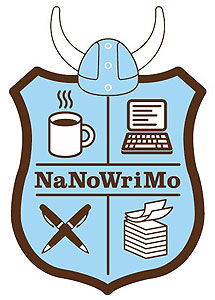
I do my best work when I have a sense of structure, when I’m allowed to bash something out on a quick turnaround time, and when I can work independently within a community. Thus, National Novel Writing Month (or NaNoWriMo as it’s known to its fans and followers) seems like something so well suited to my sensibilities that it’s a wonder I haven’t done it before. November of 2012 will be my inaugural year working on NaNo.
For the uninitiated, NaNoWriMo is fairly straightforward. Aspiring novelists must write a 50,000 word novel in 30 days. Freelance writer Chris Baty founded NaNoWriMo in July of 1999, but later moved it forward to November “to more fully take advantage of the miserable weather” in his hometown of San Francisco. Throughout the years, NaNo has grown from a small event in which Baty participated with a small clutch of friends, to an event that spans the globe and has spawned a number of best-selling books. (If you read Water for Elephants or The Night Circus, congratulations: you have enjoyed the fruits of NaNoWriMo.) A lively community has sprung up among aspiring writers in Boston, replete with overnight write-ins and games of Word Wars on the regional board.
Book Review: Zombie Eye For The Living Guy: Look Undead, Cook Undead, Dress Undead, and Live Undead
Published on October 25th, 2012 in: Book Reviews, Books, Comedy, Halloween, Horror, Reviews |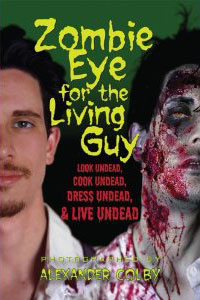
In a world where The Walking Dead is one of the most successful TV programs on the air, where politics shambles on brainlessly, and it seems that the end times are nigh, why wouldn’t you want to dress like it’s Halloween? If you live for the absurd and obscene, there is at last a lifestyle book for you and your peers. This black-hearted parody of the best-selling Queer Eye for the Straight Guy tie-in books brings an undead perspective to the perennial challenge of living well, looking good—or, in this case, horrible&mdash’and being exactly the decaying, mindless flesh eater you’ve always wanted to be.
For those who have read the Queer Eye book, the parody is dead-on and hilarious. With sections titled such things as “Inner Preparations,” “Should I Eat Human Brains?” and “Social Skills,” every aspect of the gruesome, yet satisfying world of being a walking abomination is addressed with wit, variety, and a very silly thoroughness. Yet this is not just a point-by-point parody; Zombie Eye also contains quite a few pointers to enrich and enliven (so to speak) any good zombie costume for those still breathing.
Book Review: The Minus Times Collected
Published on October 3rd, 2012 in: Book Reviews, Books, Comedy, Reviews |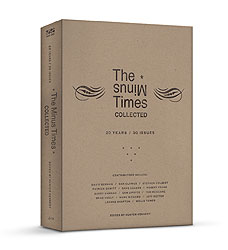
What is it like to take a time machine back to a time when I was a burgeoning sarcastic twenty-something with a tendency to sneer and a sense of humor as black as it comes? The recent Minus Times Collected, lovingly assembled for its 20th anniversary, is a portal to that time, for me at least. Is it a place I want to be, though?
When confronted with work like this—a relic full of irony for irony’s sake that creates a critical distance on purpose—it only brings out my ponderous side. By definition, isn’t nostalgia supposed to create a sense of wistfulness and yearning? Sure, I like a thumb in my eye when the humor feels earned, and I realize that this style should be different because it isn’t meant to feel cozy and warm. When I looked back at this wicked side of this particular collection it only served to make me realize that there are other and better time capsules, ones that are consistent and head and shoulders above this in quality.
Book Review: The Wrong Word Dictionary
Published on September 27th, 2012 in: Book Reviews, Books, Reviews |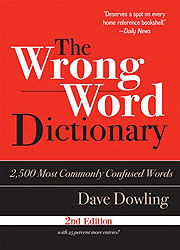
Are you one of those people that flies into a laser-eyed rage when you see grizzly misused in the place of grisly? Or are you one of those people who has no idea what the difference is between a gourmand and a gourmet; all you know is that they love their food or something? The English language is a tangly beast, easy to give the impression of mastery for any native speaker, and yet almost no one, even linguists, editors, professors of English, or journalists writing in the New York Times (ahem) will always choose the correct word, sometimes using an incorrect homonym or a related word, and only the driest (or perhaps the most frothy) pedants ever seems to notice.
Book Review: Raising Hell: Ken Russell And The Unmaking Of The Devils By Richard Crouse
Published on September 24th, 2012 in: Book Reviews, Books, Current Faves, Movies, Underground/Cult |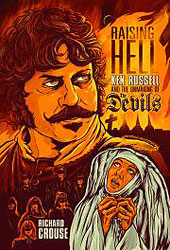
If you live in or around Toronto, Ontario, Canada and you like movies, then you’ve already heard of Richard Crouse. For the rest of you, he’s a Toronto-based film critic and TV personality, who can be seen on both Canada AM and CTV’s 24-hour news channel (as well as at nearly every film event and festival in the Toronto area). Most importantly:, he’s also a tremendous, lifelong fan of filmmaker Ken Russell.
Crouse’s latest book (he’s written six others) is all about Ken “Enfant Terrible” Russell’s most controversial and frequently misunderstood 1971 film The Devils, starring Oliver Reed and Vanessa Redgrave. Raising Hell: Ken Russell and the Unmaking of The Devils begins much like my own recent reintroduction to Ken Russell: a prologue detailing Crouse’s 2010 meeting and interview with Russell in conjunction with Rue Morgue’s Festival of Fear screening of The Devils.
Assemblog: August 31, 2012
Published on August 31st, 2012 in: Assemblog, Books, Critics/Criticism, Feminism, Film Festivals, Movies, Streaming, The Internets |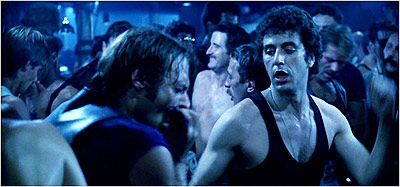
Cruising, 1980
New this week on Popshifter: John talks about the secret handshake and Booker T. and the M.G.s’ Green Onions reissue on Stax; Melissa B. wonders if Harry Shearer’s Can’t Take A Hint is timely; guest blogger and author Alex Bledsoe gives the deets on Rafael Sabatini and pirates; Chelsea loves Micah Sheveloff’s Exhibitionist and the singer/songwiter’s “lived-in marvel of a voice”; I proclaim Big Black Delta’s Tour EP to be “diverse” and “thrilling”; and I share some photos from FanExpo Canada 2012.
The Man Who Gave Us Pirates
Published on August 29th, 2012 in: Books, Movies |By Alex Bledsoe
Alex Bledsoe is guest blogging today on Popshifter. Our Q&A with him appeared in our 2010 Halloween Horrors issue, Season of the Witch.
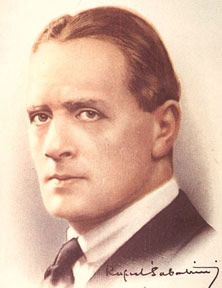
Rafael Sabatini
My fourth Eddie LaCrosse novel, Wake of the Bloody Angel is about pirates. Yes, those filthy, illiterate, ruthless criminals of the sea who tortured, raped, murdered, and pillaged their way into history in a surprisingly short period of time (roughly 1690-1730). And after reading about some of their deeds, I was struck by this question: why the hell do we admire these people? Why do we look up to them as heroes, write books and make movies about them, give them sexy faces like Errol Flynn, Tyrone Power, and Johnny Depp?
And then I realized it’s mostly because of Rafael Sabatini.
The Killer Inside Me
Published on August 3rd, 2012 in: Books, Movie Reviews, Movies, Over the Gadfly's Nest |By Paul Casey
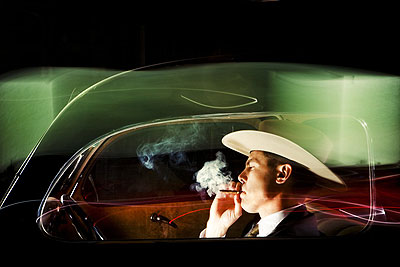
All art should be able to cover bad thoughts and bad people, as they exist, or could exist, without having to make these things pay back society in some sense. After reading Jim Thompson’s The Killer Inside Me and watching Michael Winterbottom’s 2010 adaptation, it seems that many critics demand moral payback. Taking Lou Ford and making him a cautionary tale, or something for upstanding society to feel superior to, would make a lot more people comfortable.
Assemblog: June 22, 2012
Published on June 22nd, 2012 in: Assemblog, Books, Canadian Content, Film Festivals, Horror, Media, Movies, Science and Technology, Trailers |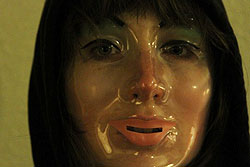
Image from V/H/S, 2012
New this week on Popshifter: Thoughts On: THE BAND, Music From Big Pink; reviews of Silver Jews, Early Times and Harry Howard and The Near Death Experience; new Robyn Hitchcock song “There Goes The Ice;” Theresa Andersson in Cambridge MA; an interview with author A. Jay Lee; and that burning question: Are The Originals The Best?